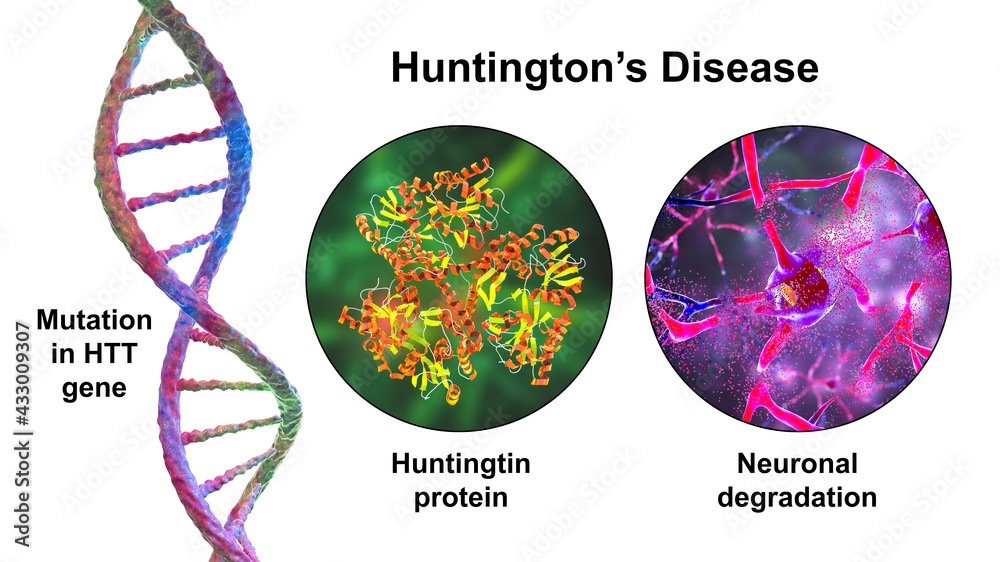Huntington's disease (HD)
Find a neuro specialistHuntington’s disease is a neurological disorder that causes involuntary movements and mental deterioration that get worse over time. People who have it gradually lose the ability to control their bodily functions.
If you or a loved one have potential Huntington’s disease symptoms, see your Advocate Health Care doctor to learn more and get treatment as quickly as possible.
What is Huntington’s disease?

A representation of the mutation that causes Huntington’s disease, the abnormal proteins created because of the mutation and the eventual damage to nerves in the brain.
Huntington’s disease, also known as Huntington’s chorea or Huntington chronic progressive hereditary disease, is caused by a mutation in the HTT gene, also known as the huntingtin gene.
When you have Huntington’s disease, cells produce an abnormal version of the huntingtin protein, which disrupts the normal function of nerve cells in the brain. The abnormal proteins damage brain nerves and lead to the development of Huntington’s disease symptoms.
Huntington’s disease is often inherited. It can also develop spontaneously without a family history, which is referred to as sporadic Huntington’s disease.
At what age does Huntington’s disease appear?
Huntington’s disease is typically first diagnosed in adults during their 30s or 40s. However, it can occur in children and adolescents. If it starts at a younger age, the symptoms tend to progress more rapidly than in adults.
While Huntington’s disease is relatively rare overall, it’s even less common in children. Approximately 6% of all diagnosed cases of Huntington’s disease occur in children or adolescents.
Life expectancy with Huntington’s disease
Huntington’s disease significantly impacts life expectancy. Adults with Huntington’s usually live 15 to 20 years after the onset of symptoms, while children typically survive 10 to 15 years after symptoms begin.
Huntington’s disease symptoms
When nerves in the brain are damaged by Huntington’s disease, distorted messages from the brain lead to a variety of physical and mental symptoms.
The symptom most commonly connected to Huntington’s disease is a type of involuntary muscle movement (dyskinesia) called chorea which consists of jerking muscle movements. Huntington’s disease may also cause these symptoms that affect muscles:
- Rigid muscles (akinesia)
- Unusual unchanging postures (dystonia)
- Unintended stretching reflexes (hyperreflexia)
- Slowed movements (bradykinesia)
These muscle symptoms may occur in different combinations at different times as the disease process. Any of them make both fine motor skills, like buttoning a shirt, and large motor skills, like walking, difficult if not impossible.
Other potential Huntington’s disease symptoms include:
- Fatigue
- Insomnia
- Loss of energy
- Seizures
- Slurred speech
- Tremors
- Unusual eye movements
People with Huntington’s disease may lose too much weight because of problems with swallowing and eating. They can also develop infections because of problems with choking.
Mental & emotional symptoms of Huntington’s disease
Huntington’s disease also causes mental disorders that interfere with daily living. You may have trouble with things like talking, organizing your thoughts, making decisions and learning new things. People with Huntington’s disease may isolate themselves from other people either unconsciously or intentionally.
As mental and physical symptoms progress, people gradually lose the ability to drive, work and perform self-care tasks. Serious behavior changes may occur such as irritability, mood swings, angry outbursts, depression and losing touch with reality. However, it’s been observed that people with Huntington’s disease seem to maintain awareness of what’s going on around them and the ability to express their feelings.
Diagnosing Huntington's disease
Diagnosing Huntington’s disease requires several different tests, including testing your reflexes, muscle tone, hearing, walking, balance and mental status. Your doctor will also inquire about your family and personal medical history.
Your doctor may consult with specialists to help with diagnosis and treatment, including psychiatrists, neurologists or speech pathologists. Brain imaging tests such as MRI will be ordered to look for brain changes that indicate Huntington’s disease.
Your blood will be tested to rule out other conditions and may be used for genetic testing to help confirm or rule out Huntington’s disease. Parents who worry about passing Huntington’s disease on to a child may be advised to consider genetic testing.
Treatment for Huntington's disease
Huntington’s disease can’t be cured or prevented. Huntington’s disease treatment focuses on treating the symptoms and maintaining quality of life. Symptoms such as hallucinations, delusions, violet outbursts, anxiety, depression and Huntington’s chorea may be managed with medication.
Your doctor will encourage you to pay attention to any side effects of medications and help you decide what medications are best for you.
Clinical trials are underway to look for new Huntington’s disease treatments. Along with other subjects, researchers are exploring the cellular basis of Huntington’s disease. They’re looking at things such as:
- How other changes to the Huntington gene affect the disease
- Chemical signaling between cells in the brain
- Optogenetics – where light beams are used to treat neurons in animals
- Biomarkers (parts of cells) that may predict, diagnose or monitor Huntington’s disease
- Stem cell study of cells donated by people with Huntington’s disease
Participating in clinical trials can be a way to gain access to new and promising treatments. Let your doctor know if you’re interested.
Get care
We help you live well. And we’re here for you in person and online.